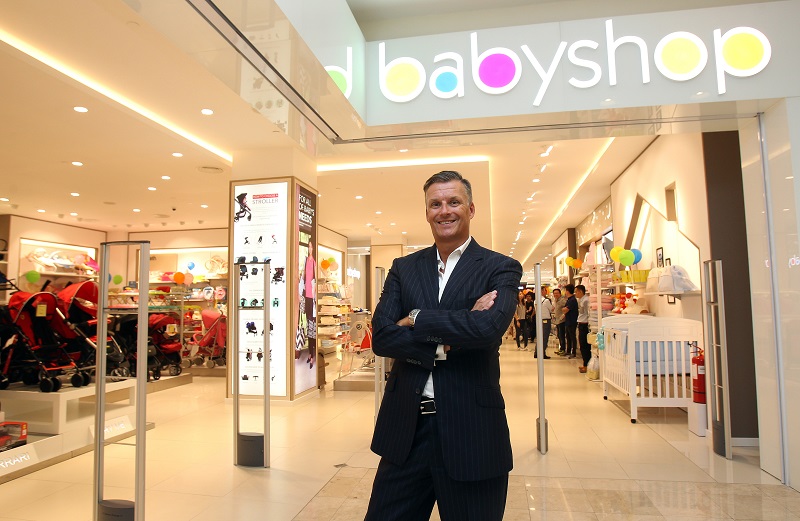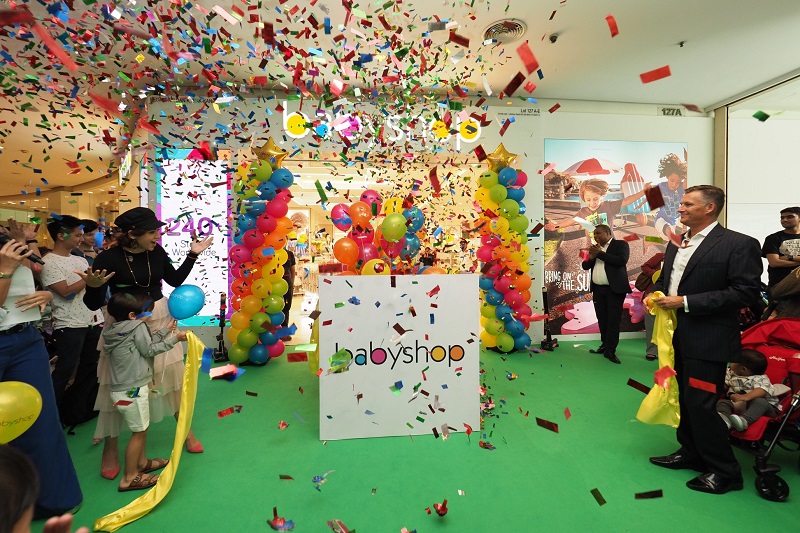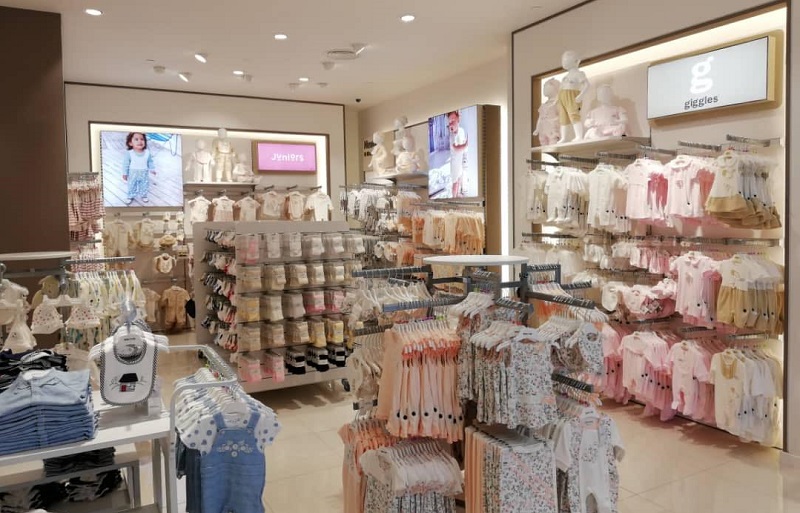
Collins was in Malaysia recently for the opening of Babyshop’s flagship store at The Curve in Mutiara Damansara, Petaling Jaya (Photo: Mohd Izwan Mohd Nazam/The Edge)
Pause, listen and adapt. On the shop floor, this business philosophy involves getting customer feedback, looking at the gaps on the shelves and deciding where the opportunities lie in the industry.
The next step is to respond accordingly, says Babyshop CEO Richard Collins, who attributes the success of the children’s retail chain to listening and adapting to customer needs. “Of course, we won’t get it right 100% every time. But I think we’ve got the majority of it right as a starting position.”
Collins was in Malaysia recently for the opening of Babyshop’s flagship store at The Curve in Mutiara Damansara, Petaling Jaya. It is the brand’s fifth outlet, after the first two — at MyTown Shopping Centre in Cheras, Kuala Lumpur, and IOI City Mall in Puchong, Selangor — welcomed customers eight months ago. They were followed by one in Melaka’s Dataran Pahlawan Megamall and another in East Coast Mall, Kuantan.
The debut brand of multi-retail conglomerate Landmark Group, Babyshop first opened in Bahrain in 1973. Today, it has more than 240 stores in 15 countries that stock an extensive product mix laid out across a total of three million sq ft of bright, modern retail space designed for comfort and ease of movement.
Emphasising that Babyshop does not just sell merchandise, Collins says: “We are really helping with solutions because parents — in particular mothers having their first child — don’t necessarily know what they need, and want help. When they come into our shops, it’s about the experience they get and the knowledge we can impart in answering some of the questions they have. And we reassure them through that journey of bringing up their children.”
He initiated the personal assist concept, whereby trained staff give professional advice on what to buy for baby. Offering discerning parents a combination of products and practical solutions is the brand’s way of helping them “give their children the best start in life”. It is a responsibility Babyshop takes to heart with four categories of merchandise in Malaysia — fashion for newborns to 10-year-olds, baby basics (clothing and non-apparel items), nursery and feeding essentials, and toys — that reflect its business proposition in Bahrain. “We’re very confident about the proposition and basically lifted it and brought it into this region,” Collins says.

Feasibility studies show that Southeast Asia is a mature market with lots of children and shopping malls, but there is “nobody of this scale doing everything under one roof with the breadth of offer, service and environment that we have. We pushed hard to open five stores within five months in Malaysia — the fastest we’ve ever opened in any geography — and plan to set up some more when we get the right locations”, he adds.
Babyshop launched in Thailand before Malaysia and hopes to enter Indonesia in the middle of next year. Meanwhile, it is looking at Vietnam and the Philippines.
“We want to be moving into a market where you don’t necessarily have to reinvent yourself because you want to be able to scale up, to have the buying power. The core business is very important while we build up new propositions in different geographies. Everything here is pretty much what you will see in the Middle East. What we need to do is buy a little bit more locally, to understand some of the local brands people buy into because that’s what they are used to, and to stock them here.”
In-house labels — Juniors, Giggles and Eligo — make up the bulk of its inventory, but international names such as Avent, Tommee Tippee, Disney, Munchkin, Chicco, Barbie and Charmz are available too. The brand has an ongoing child safety initiative that sees it raising awareness of the importance of car seats, gates at the bottom of staircases, window locks, edge and corner guards and other such products.
Thorough due diligence has the team talking to competitors and studying the price architecture in the market place, Collins says. “We’re constantly looking at what customers are buying into and if we need to adjust our prices accordingly, we will. In the Middle East for this autumn/winter, I dialled down some of my entry price points to make sure we’re not drifting away from the value players. It’s important that customers feel they are being dealt with fairly and can trust our price integrity.”

Meeting customer expectations on every level — from product range to affordability, store design and shopping experience — is crucial because “that’s what will quickly give us gravitas in the market and word of mouth. That is why we’re always listening, learning and responding”.
Collins could well be speaking about himself. His three decades of retail experience include managing stores for Marks & Spencer and board positions in property and retail operations with high-street brands BHS and Allders. In 2005, he joined Tesco as director of operations for UK clothing before becoming chief executive of F&F Clothing, one of the top five retailers of apparel in Britain in terms of volume.
Raised in the UK, Collins, in a hurry to earn his own money, had planned on going into banking. But his mother influenced him to join M&S, “the university of retail in the 1980s”. He spent 10 years there and 11 at Tesco. “When I left, I was looking for an opportunity to join a brand which I felt had some real heritage but also global stretch. Babyshop is a great fit for me, and obviously the Landmark Group.
“I think I was coming in with a fresh pair of eyes and am really motivated by the opportunities we have. I’m bouncing out of bed in the mornings. Having been in retail for 30-odd years, I feel as energetic as ever, if not more so. It’s exciting to be able to take a brand and move into a new market straight from scratch.”
Aware of the economic challenges Malaysia is facing, Collins is optimistic. “Sometimes, you’ve got to grab the opportunities. If you wait for the perfect time, you can miss them — I’ve always been a believer of that.”
One positive thing he has observed over the years is that in bad times, nothing is more insulated than baby products because “nobody wants to compromise on baby. It’s love”.

“I have experienced downturns in different markets with different retailers. It is during the difficult times that you learn the most about yourself and your business, when you have to really think about what’s right for customers. And you react and make things better. Personally, that’s the approach I always take and it has always worked for me and the businesses I’ve worked in. I’m not surprised Babyshop has done well in the way we have planned because we surprise people.”
With the feedback his team has received since opening in the country, Collins says what he would do differently is upweight the range for newborns and babies, and decrease that for four to 10-year-olds. “Clearly, customers [are saying] our range is better than anybody’s in the market for baby. That’s the real gap we have filled. Having established five stores, we are looking at how we can leverage some of the marketing to broaden awareness of the business.”
The market for older children is more competitive because they have a bigger say in what they want and are influencing parents to make purchases, he notes. Bring in social media and spotting the right trends becomes even harder.
On the plus side, online shopping and young mothers sharing their experiences and proudly posting Instagram shots of purchases mean publicity for the business.
“Shopping is now so different and retailers have to embrace that. I think we’re close to what’s happening — we’re already thinking differently. We just need to get ourselves organised and make it happen. Things are moving very fast and it’s really exciting for retail,” says Collins, who certainly is tuned in to change.
This article first appeared on Oct 22, 2018 in The Edge Malaysia.


